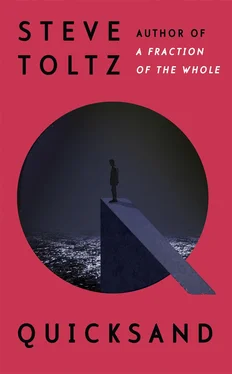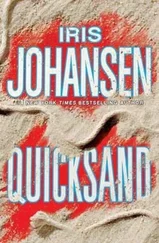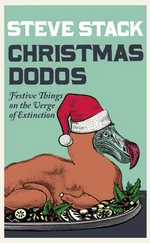She is wheeled into an echoey delivery room. The unused heart monitor sits there, incidental, accusatory. The nurse is saying, ‘We can give you all the pain medication you need because there’s no risk to the baby,’ as if that bright side were actually bright. Aldo finds himself unable to stop his old worries, and speaks out against an epidural — she doesn’t want a spinal injury on top of this, he says — and then it all happens quickly, and despite himself Aldo thinks of the seventies and early-eighties comedy trope of the surprise black baby and how that would play in a stillbirth situation.
Everything they’d read and heard about in the classes is happening; Stella is induced and has painful contractions and Aldo is beside her saying things like push and breathe and everything’s a nightmare, everything, expelling the placenta, the episiotomy, the icepacks, but when the baby comes out, no one says, ‘It’s a girl,’ and there’s no monitoring of the heartbeat, there’s no cry. There is only silence, an incredible silence, like the silence of the desert, or the silence of a plane gliding without engines over a menacing seascape, or of a body submerged in bathwater, or of a mute television showing an exploded bus, or soundless like a Portuguese housekeeper seen sobbing through a picture window. As Aldo looks at his child, he remembers his very first memory on earth: the detestable quiet of a summer’s day, the hottest day on record, and the Benjamins sunburned as a family, him and Veronica and Henry and Leila, all four lying naked on the floor like underfed animals in a zoo during a heatwave unable to move for food or water; everyone ordering everyone else to empty the kitty litter. He wants to tell Stella this memory, but doesn’t. There’s something else on her mind. They haven’t yet named their child — it was Aldo’s idea to wait until they saw her and now, on Stella’s insistence, they struggle to name this dead girl. He buys a book of baby names from the hospital gift shop. They settle on Ruby.
The doctor asks Stella if she wants to hold the baby. Oh Christ no, Aldo thinks. Say no. She says yes. She holds onto her as if the baby were a souvenir, something brought back from a holiday in a war zone. Her translucent skin and stillness make her look like some bloodless Cupid. Stella also wants to be photographed with the baby. They do a series of gruesome family portraits: Ruby wrapped tight in a blanket, distraught mother and father holding onto her, onto each other.
Stella is holding her fingers and her fingernails and kissing the palm of her hand. She gets plaster casts of her feet and hands, imprints of her footprints. They dress and bathe the baby, and say the final goodbye as Ruby is taken away for an autopsy. Aldo organises the funeral and Stella overhears him ask if they give a discount for stillborns.
They do.
THEY WENT BACK INTO THEIR LIVES LIKE FELLOW commuters on a train stuck in a tunnel due to a body on the tracks. Stella put her guitars in the storage cupboard and shut the door and never went in and never sang or played guitar again. She also stopped sharing her thoughts, or her thoughts became unshareable, and threw herself into her depressing sales job as though she enjoyed it. They were too young to assimilate this kind of tragedy, so they partied, and they partied separately, and their own vitality and lack of gloom was horrifying to them. They had sex but only occasionally, and as unobtrusively as possible, got it down to the brevity of a haiku, or else she gave him furious hand jobs that were best avoided; who dreaded the ritual of bedtime more, it was hard to say. Aldo spent his weekends at the retirement village consoling Leila for the death of her granddaughter, and set about on a new real estate venture to buy up all the state’s murder houses for a song. That was principally to disguise his grief, but there was no real sympathy for him anyway. He hadn’t carried the child; people treated him as if she had not been his to lose, and he resented Stella for that. And now that she was no longer deeply in love with him, his financial failures, crippling debts and overall bad pecuniary fate came to define him. Money and Aldo’s irresponsible loss of it became a contentious issue in their relationship, the default issue. He owed her money, and she wanted him to pay up.
The night he knew it was over, they’d just eaten Chinese food; he cracked open the fortune cookie and pretended to read a made-up fortune. ‘May all your enemies be beautiful so you might one day hate-fuck them with pleasure,’ he said, and glanced up at Stella to see if she would write it down or make a mental note. Nothing. Hands trembling, he opened another cookie and fake-read, ‘Only schoolchildren masturbate to mermaids. Outside of the face, those sea-hotties have not a single workable orifice.’ Stella sat stone-faced, and Aldo felt swept away in a current. He smashed open another cookie: ‘Be satisfied with your looks. The almost-but-not-quite beautiful people don’t have the burden of being gawked at 24/7, and can go about their lives without looking in the mirror and seeing a plate of dog’s balls.’ Nothing. He could no longer affect, influence or help her. Now he was going over a waterfall in a barrel. He was her muse no longer.
ZETLAND HIGH’S TEN-YEAR REUNION was held in the same beer garden of an old hotel we used to be denied access to when we were under-aged. Everybody laughed about their lives as if they were simulations; those who were successful seemed visibly so, and those who were undermined for a living displayed that too. Some people were so bald and so fat your eyes felt callous just looking at them, or were so sick and so thin you started the grieving process as you bought them a drink. Well, that’s a high school reunion for you. Divorce, dead kids; even a ten-year reunion has some points of interest. Yet there was an unexpected feeling of genuine warmth; these were the people who’d known you when you were still callow and the fault of your parents, before you were the product of your own missteps.
Together, the group regressed, like a cast reunion of a long-running soap where it’s unseemly to break character. An orgy of reminiscences, pasts that needed verifying. It was a socially weird and artificial environment. Unhappily married men trying to fuck the same girls they once rejected for reasons they couldn’t remember now, and which suddenly seemed their greatest regret. Every now and then you made a fatal error. You didn’t recognise someone and to cover, you pretended they’d changed, when actually you couldn’t remember their names back then either. The faux pas added up. Aldo confused one of the Norton twins for another set of twins altogether, the Goldsbros. It was a colossal mistake. Yet not the worst of the night. The ultimate insult was when Jeremy, the fortune teller’s son, projected photographs of my out-of-control party while Natasha Hunt stood frozen in the back of the room, displaying no outward signs of life.
It had never occurred to me until that night that people in general think I’m a ridiculous human being; almost everybody laughed mean-spiritedly about the school play I’d written, The Vagina of Ill Repute ; after a few laps in that pool of memory I was ready to run, but I hung around for Aldo’s sake. A good number of people there had invested in some of his schemes and so he was forced to apologise, make excuses, impossible promises. He leaned heavily on whoever he talked to, and I overheard him say at one point, ‘I even miss the sound of Stella smoking on the other end of the telephone.’ He was greeted with amusement, old Aldo, but there was something so sad about him it no longer seemed funny.
Around ten p.m., there was a moment of old-fashioned hubbub when Stan Maxwell sauntered in, and was greeted like a scallywag coming from the headmaster’s office (his conviction had been quashed on appeal). He made a beeline for Aldo. ‘I hear we both lost a child,’ he said. For the first time in his life, Aldo was speechless.
Читать дальше











